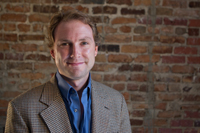Q and A with Heath Thomas
Chris Martin | January 19, 2017


Q: Tell us about yourself.
A: I have a wife, Jill, and four children from almost 11 down to about age four. We’re deeply involved in their lives. None of their daily activities (school, sports) revolve around Christian contexts, so we see those as really fertile mission fields for our family. I have been a believer since I was about 16 years old. I said, “Lord I want to serve you and follow you into whatever field you take me.”
Q: How did you come to SEBTS?
A: When we were living in the United Kingdom, and, through a series of circumstances, we were able to talk to Dr. Akin. He asked us if we would submit our resume. We thought that this may be an opportunity that God was opening up, so we did. In his goodness, God (and the faculty) brought us here. It’s a special place and a special time at Southeastern, so we feel privileged to serve here.
Q: When people ask you, “What do you do at Southeastern,” what is your response?
A: Generally, I say that I teach Old Testament and Hebrew. Primarily, I teach men and women in the riches of the Old Testament. I’m also a Hebrew professor. So I teach students how to read Hebrew and how to become better expositors. The third thing I do is direct our Ph.D. program. I lead a program in which I get to work with professors who develop students into scholar-pastors, future teachers and leaders.
Q: On what are you currently working?
A: I’ve been doing some pretty extensive work in the Minor Prophets. I’ve just finished a commentary on the book of Habakkuk for Eerdmans Publishing, and it sits with the editors now. I’m also finishing a manuscript on a theological introduction to the Minor Prophets for InterVarsity Press Academic with Dr. Craig Bartholomew. Finally, I am co-writing a book called “Gospel and Mission” for Baker Academic with Dr. Bruce Ashford. We want to connect the Great Commission to the big story of Scripture.
Q: What have you been reading recently?
A: First, “The Gospel of God’s Reign” by a German theologian named Christoph Blumhardt. I’ve also been reading again the work of Dietrich Bonhoeffer. I find him endlessly inspiring and insightful. His “Ethics” has been a fresh word to me.
Q: When you get home from work, what do you look forward to doing?
A: When I get home, I try to turn off work completely. It is family time. I try not to answer emails, phone or anything else. Almost every night, I join my wife and children for a meal together to talk about the best and worst bits of our days and generally reconnect. Then, after supper are various family activities.
Q: Who are your role models?
A: I think role models are important, but I’m not into hero worship. Our exemplar is always Jesus. Still, one role model for me is Dr. Jay Strack. He has been a spiritual mentor for me since I was a young man, and I have learned volumes from him.
The other role model that immediately comes to mind is my father. When you see a life well-lived for the Lord over a lifetime, you can’t help but think, “I want to do that too.” That’s my father for me.
Q: What has God been teaching you lately?
A: More than anything, I am learning to have a heart of joy in all things. Life can be busy and can grind you down if you’re not careful. So, my wife and I have been praying for joy in all things.
Q: Where are some of your former students?
A: Two of my students who are married are in a majority world context serving as missionaries. We keep in touch with them because our home group has adopted them.
I also have students who minister in North America, as well as students who are pursuing teaching at various universities across the globe: Cambridge, Toronto, Bristol and Oxford.
Q: When a student completes your class, what do you want him or her to walk away with at the end of the semester?
A: I want students to have a deeper love for the Lord and a deeper love for Scripture. That’s my primary job here. I would also like students to have an appreciation of how the Scriptures fit together, the Old and New Testaments together testifying to Jesus.
Q: We always say that every classroom at SEBTS is a Great Commission classroom. What does that look like for your class?
A: When we think of the Great Commission, we think about sharing the gospel. That’s true. But we cannot forget that the Great Commission has to do with understanding Christ’s lordship and following him in all of life – fully formed disciples of Jesus in all fields of the world. I aim at both facets in my classroom.